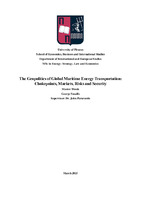The geopolitics of global maritime energy transportation : chokepoints, markets, risks and security

Master Thesis
Author
Smailis, Georgios
Σμαΐλης, Γεώργιος
Date
2025-03View/
Keywords
Maritime energy transportation ; Maritime chokepoints ; Chokepoint Resilience Index (CRI) ; Maritime security ; Global oil ; LNG trade ; Z-Score Calculation ; Bab-el-Mandeb ; Northern Sea Route (NSR)Abstract
Global maritime energy transportation is a critical pillar of the world economy and is deeply intertwined with geopolitics, as vital chokepoints—such as the Strait of Hormuz, the Strait of Malacca, and the Suez Canal—control the flow of oil and liquefied natural gas (LNG). These chokepoints are strategic maritime passages essential to the global energy system. This thesis explores the geopolitical and economic significance of maritime chokepoints in global energy transportation, focusing on their vulnerabilities, risks, and resilience. Maritime chokepoints serve as critical nodes for transporting oil and natural gas, which form the backbone of the global energy supply chain. However, these chokepoints face significant risks from conflicts, piracy, terrorism, and environmental hazards, making their security a pressing concern for energy markets and international stability. To address these challenges, this study introduces the Chokepoint Resilience Index (CRI), a novel analytical framework that evaluates resilience across six dimensions: geopolitical, economic, alternative routes, geomorphological, historical, and environmental factors. By analyzing quantitative data from 2020 to 2024, the CRI reveals the resilience levels of major chokepoints. It identifies the Strait of Hormuz as the most resilient due to its strong military presence and robust infrastructure, while Bab-el-Mandeb ranks as the least resilient, reflecting heightened instability and recent Houthi attacks. Furthermore, the thesis examines disruptions in chokepoints, particularly in the Red Sea, concluding that these events have increased shipping costs, affected global energy prices, and raised insurance premiums. The research also evaluates the potential of emerging alternative routes, such as the Northern Sea Route (NSR), as a viable solution to minimize dependence on traditional chokepoints. However, the geopolitical complexities in the Arctic—driven by competing Russian and NATO interests—underscore the challenges of adopting these new pathways. By offering a multidimensional perspective on chokepoint vulnerabilities, this thesis provides valuable insights for policymakers, energy stakeholders, and the maritime industry. It underscores the urgent need for international collaboration, enhanced security measures, and innovative strategies to ensure the stability of global energy flows amid evolving geopolitical tensions. Ultimately, this research advances discussions on energy security, maritime logistics, and global economic resilience in an era of heightened uncertainty.


